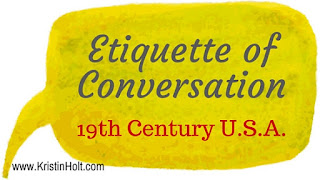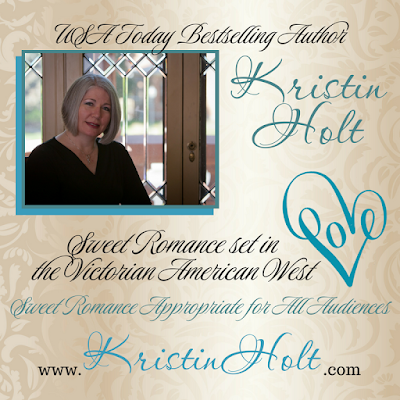by USA Today Bestselling Author Kristin Holt
The following vintage newspaper article, titled Courtship after Marriage (from The American Rural Home), published on January 6, 1886 in The Millbrook Herald of Millbrook, Kansas. The title naturally caught my attention, and later discovered the 1886 attitude about how courtship can and should continue after marriage is an ideal basic premise in my WIP (work in progress), The Silver-Strike Bride (Prosperity’s Mail-Order Brides, book 2 (book 1- The Bride Lottery), is also set in 1881.
How 1886 this article sounds! The advice in this article resembles what today’s gurus about successful marriages would say—but only just. I find it interesting that Victorians were so appearance-focused, as clean and tidy equaled, apparently, respect and courtesy.
I must emphasize that while my heroine Caroline supposes that an ongoing courtship in the manner that this article, and she reads a bit too much into her new husband’s behavior, the more Tom comes in from his mine (or doesn’t) without cleaning up for her, the more she “borrows trouble”. The tagline for this WIP is Sweethearts with Secrets, it’s a safe bet that this after-marriage sweet romance will be troubled by the secrets both Tom and Caroline are keeping, no matter how prudent their reasons. Some things, it seems, can’t be hidden behind tidy, clean hair and the most orderly of appearances. (I’m loving this story! I can’t wait to share it with you.)
I’ve transcribed the article precisely as spelled, formatted, and punctuated (yes, even the typos where the type was misplaced: Instsad, envolving and similar accepted spellings like ‘overhalls’ and 'undoubtly'). I find the 1886-speak captivating. The tone and content of this article is SO late-nineteenth century.
Courtship after Marriage.
The American Rural Home.
We wish to say a few words, in all gravity, to young farmers and their wives, who have entered into the nearest, sweetest, most sacred relation it is possible for individuals to assume towards one another, in this world. You have formed a life union to establish a family; to obtain a competency for your support and for the support and education of those human beings who may be the result of your union; to build up a rural home that shall be a pleasant, beautiful dwelling-place for you while you live, and for your children so long as they shall live with you, and a place that shall live in their memories, when they shall have gone forth from the parental home to establish, for themselves, homes in the world.
For some time previous to marriage, possibly for years, you passed through a period of what is called courtship, in common parlance, in which essayed to win the favor, the affections of the other. During that time each sought to be agreeable to the other, in dress, in language and in actions. The young man, when about to visit the young lady, undoubtly tried to make herself as presentable as possible. He probably washed himself clean, so that he might not carry any of the dirt and filth of the farm and the domestic animals into the presence of the lady, he was wooing. He probably put on clean linen, brushed and donned his best apparel, blackened his boots, and presented himself to his lady at his very best. And the young lady, does any one doubt that she selected her most becoming dress, her most bewitching ribbons and collar, and that her hair was arranged in the most attractive style, when she expected a visit from her suitor?
Each had succeeded in winning the love of the other, and both are satisfied that their nuptial happiness will be greatly enhanced by uniting their lives, traveling life’s mysterious pathway together. Doubtless, they individually create an ideal for their future married life, in which each shall find his or her highest enjoyment and happiness in ministering to the happiness of the other. This is all well; it is wisely ordained that the young shall indulge in bright, lovely visions of the future and that the most intense, most powerful passions and sentiments of human nature shall conspire to bring about the conjugal union.
The marriage is consummated; the young couple move to their rural home; does courtship continue? “But,” says the reader, “they have won each other’s love, wherefore the necessity of further courtship?” Perhaps some of the means used to win love, may be necessary to retain it. Let us consider.
In courtship they seek to win love by making themselves agreeable, by seeking to please; can they retain love, if disagreeable, if regardless of pleasing? There are numerous ways in which these holding the relation of husband and wife may render themselves agreeable or disagreeable to each other. In courtship we see how careful the man is to make himself as presentable as possible, when about to appear in the presence of her, he is wooing. Can he entirely neglect his personal appearance after marriage without injuring the feelings of his wife? Can he go into the presence of his wife, morning, noon and night, with soiled hands and face, with his garments plastered with the earth he cultivates and odorous with the scent of domestic animals and his boots smeared with their offal, without provoking in her the thought that he is a little lacking in that tender respect which he always showed her in his anti-nuptial courtship?
“But how is he going to help it? You would not expect a farmer to change his clothes every time he goes into the house, would you?”
No, that would hardly be practicable. But it is practicable for a farmer to so arrange his dress for labor and for the house that, with a very little delay, he can make himself quite presentable, when he comes in for his meals or to spend the evening at his fireside. Every farm-house should have a back lobby or entrance, as well as a front hall, and therein a farmer can hang his work clothes, or overhalls. There should always be a foot-scraper and mat at the back-door. The farmer, when he comes in to his meals, can scrape and clean his boots, slip off his overhalls and on his clean coat, wash, brush his hair and clothes, and appear at the table tolerably clean and free from offensive odors. If his boots are too filthy to properly clean, without consuming too much time, he can have a pair of slippers and boot-jack convenient, remove his boots and put on his slippers in a very short time. That is probably the better way when he goes into the sitting room in the evening, and a soft dressing gown is neat and comfortable, as an evening garment.
The man feels more self respect, complacency, in clean garments in the house, and the woman is flattered by such an exhibition of regard to her feelings. Instsad of saying, by action, “I have secured you, you are mine and I shall now consult my ease, without regard to your feelings;’ he says, “I am just as anxious to make myself agreeable to you, to please you, as I was before I was assured that I had secured your affections.”
On the other hand, the wife, who in the old courtship, had been so careful never to appear in the presence of her suitor until she had made herself as attractive and winsome as possible, often becomes quite careless of her personal appearance at home, with no one present but her husband, although she may still be very particular about her dress and appearance when she goes into society. Ah! young wife, it will pay you to strive to preserve the vision of loveliness that won your husband’s love as long as possible. See that he is not too rudely awakened from his enchantment, or you may never be able again to weave the spell around him.
Not only in dress and personal appearance should husband and wife seek to continue their courtship after marriage, but also in language and conduct. They were accustomed before marriage, to address each other in respectful, tender language, to say nothing that would wound the feelings or make the other unhappy; let them be equally as careful, in these respects, after marriage. And, as the husband, before marriage, was solicitous to relieve her, who is now his wife, of every burden, and avert every avoidable infelicity, let him be equally solicitous now, that she has placed her life’s happiness in his keeping. On the other hand, if the wife truly loves her husband and desires his welfare and happiness, she will not be unnecessarily exacting of services, will not convert the power she possesses over his affections into a petty tyranny. It depends largely upon this second courtship, whether the affections elicited in the first courtship shall be enlarged, strengthened, made enduring, or gradually extinguished. Were there more of this post-nuptial courtship there would be much less employment for divorce courts.
Husband and wife living together as we have faintly indicated, will do more towards envolving beautiful, attractive, happy rural homes, than unbounded wealth, supplemented by artistic tastes and capacities, can possibly create by means of landscape ornamentation, architectural construction of interior decoration, for the loves and virtues , must preside over true homes.
There it is. Voices from the grave, as it were, about how to ensure your rural home is encircled by unbounded wealth, and that husband and wife live in conjugal felicity. (I’m not sounding sassy. Not at all. I rather adore the American Victorian era, as all of my published fiction verifies.)
 |
| Kristin Holt's WIP (work in progress) |
Interested in more about The Silver-Strike Bride? See the book’s page on my website for an ever-growing cache of blog articles about historical elements within the story. Stay tuned with news of this title’s release by following me on BookBub, friending my Facebook Profile, Liking my Facebook Page, or even subscribing to my once-a-month newsletter.
Related Blog Posts: (click on image)
See all of my posts on Sweet Americana Sweethearts, HERE!
Kristin Holt, USA Today Bestselling Author, writes Sweet Victorian Romance set in the American West. She writes frequently about Old West history and contributes monthly to Sweet Americana Sweethearts.
Website | Email | Newsletter | Twitter | Pinterest | g+| Facebook Profile | Facebook Fan Page | Goodreads | BookBub | Amazon
Copyright © 2019 Kristin Holt LC














No comments:
Post a Comment